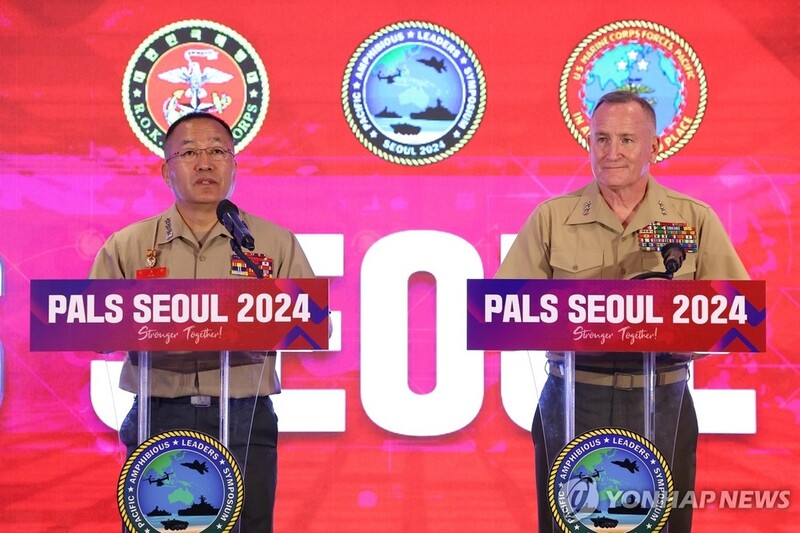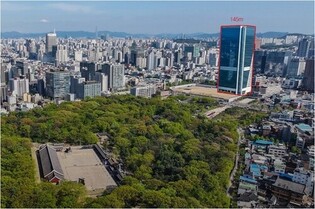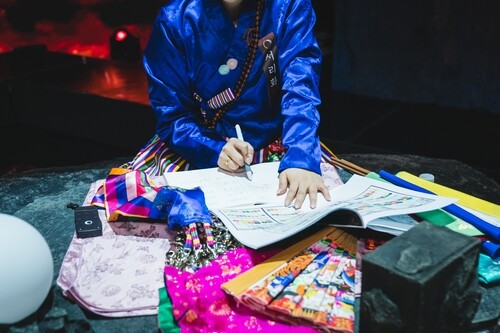 |
| ▲ Marine Corps Commandant Lt. Gen. Kim Kye-hwan (L) and Lt. Gen. William Jurney, commander of the U.S. Marine Corps Forces Pacific, speak to reporters at the Pacific Amphibious Leadership Symposium in central Seoul on June 3, 2024. (Yonhap) |
Marine Corps-amphibious exercise
S. Korea's Marine Corps chief rules out trilateral amphibious exercise with U.S., Japan
By Chae Yun-hwan
SEOUL, June 3 (Yonhap) -- The South Korean Marine Corps is not considering a trilateral amphibious exercise with its U.S. and Japanese counterparts, its top commander said Monday, ruling out such drills as part of a new joint multi-domain exercise set for this summer.
Lt. Gen. Kim Kye-hwan made the remark at an amphibious forces conference in Seoul, after Defense Minister Shin Won-sik and his U.S. and Japanese counterparts, Lloyd Austin and Minoru Kihara, agreed on holding the new exercise during their three-ways talks in Singapore on Sunday.
The three-way exercise, named Freedom Edge, will take place across multiple domains this summer, a joint statement read, without offering details, raising questions on whether it could possibly involve ground and amphibious forces.
"A South Korea-U.S.-Japan amphibious exercise has not been discussed or considered, and even if this area is developed, it would not be decided by South Korea's Marine Corps, but would need further consideration by the defense ministry," Kim said at the Pacific Amphibious Leadership Symposium.
While the three countries have recently held air and sea drills outside the Korean Peninsula to bolster security cooperation against North Korean threats, they have yet to stage a trilateral ground or amphibious landing exercise.
South Korean officials appear to be mindful of possible public backlash against such drills that could involve Japanese forces coming into South Korea and evoke memories of Japan's brutal 1910-45 colonial rule of the Korean Peninsula.
The two Asian neighbors have been embroiled in historical spats stemming from the colonial rule, but growing military threats from North Korea have led them to bolster defense cooperation with their shared ally, the United States, despite their differences.
At the conference, Lt. Gen. William Jurney, commander of the U.S. Marine Corps Forces Pacific, said his unit is looking at opportunities across all armed forces to best operate across all domains, while noting that his comments are not policy decisions.
"We are all collectively looking at what those opportunities and challenges are but not specific to any particular exercise or nation," he said.
The annual gathering is co-hosted by the South Korean Marine Corps and Jurney's unit this year and brings together some 300 officials from 24 countries in the Indo-Pacific region to discuss ways to enhance cooperation and develop amphibious operations.
The head of the Amphibious Rapid Deployment Brigade of Japan's Ground Self-Defense Force also attended the event.
Seoul, Washington and Tokyo have bolstered trilateral security ties over the past year after their leaders agreed on a series of efforts to better deter and respond to North Korean nuclear and missile threats during their Camp David summit in August last year.
Last December, the three countries established a multiyear exercise plan and launched a real-time sharing system on North Korea's missile warning data in line with the agreements made at Camp David.
(END)
<저작권자(c) 연합뉴스, 무단 전재-재배포, AI 학습 및 활용 금지>
(C) Yonhap News Agency. All Rights Reserved


































